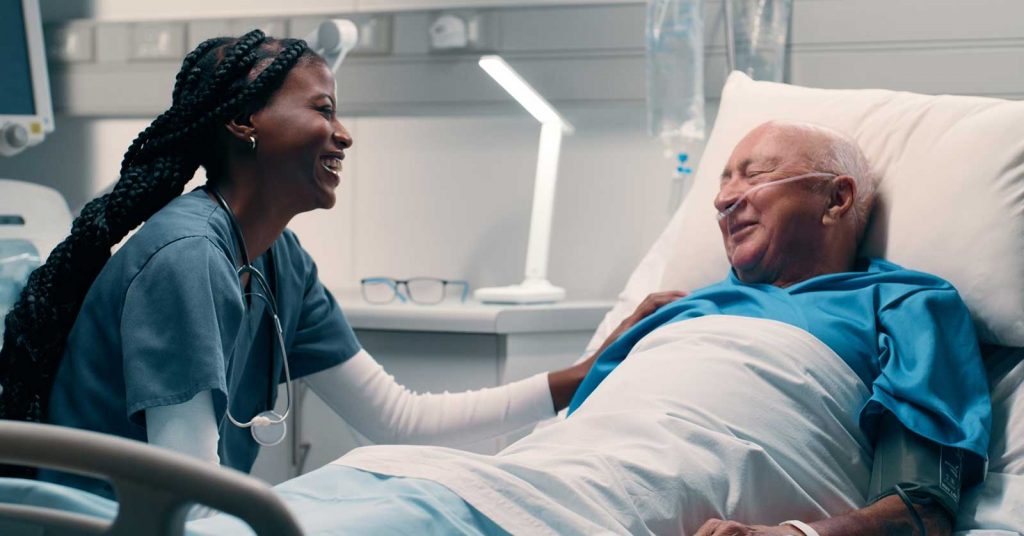Never heard of allied health? Allied health has heard of you! From birth to childhood, adolescence, and older adulthood, people in allied health careers play a pivotal role throughout all stages of life. It’s no wonder allied health professionals deliver an estimated 200 million health services annually!1
Allied health professionals support, diagnose, treat and rehabilitate clients. But what exactly is an allied health career, and how do allied health workers help shape the future of healthcare? Let’s reveal the prognosis.
What is allied health?

Allied health spans a wide range of professions. Let’s start with what allied health is not. Medical, dental or nursing professionals are not considered ‘allied health’ professionals. So does that mean an allied health professional covers all other healthcare workers?
Charles Sturt University Associate Head of the School of Allied Health, Exercise and Sports Sciences, Melissa Skein explains.
“While there is no one single definition for allied health, in principle, allied health professionals are university qualified practitioners who have expertise in preventing, diagnosing and treating people with a range of conditions and illnesses. Allied health professionals often work in a multi-disciplinary team to provide the best health service and care for clients, groups and communities.
“Work as an allied health professional is extremely rewarding, where a treatment session, exercise class, or consultation can have a pivotal impact on an individual’s quality of life and wellbeing.”
What allied health careers are there?
Allied health spans a fascinating and versatile network of healthcare professions. In Australia, 300,000 allied health professionals represent nearly a third of the entire health workforce.1
Here are just some of the allied health careers in Australia:
- exercise physiologist
- occupational therapist
- paramedic
- pharmacist
- physiotherapist
- podiatrist
- speech pathologist
How can I start an allied health career?
So you want to become an allied health professional. That’s great! Here’s what to do.
- Research allied health careers: Since there are so many allied health career pathways, you’ll want to find the one that’s right for you. Research your preferred allied health occupations online. Talk to allied health professionals to find out what their industry is really like (watching the videos in this post is the perfect place to start!). And explore Map My Health Career, which allows you to learn about the many career opportunities allied health has to offer.
- Study allied health: If you have your eye on an allied health career, your first step is to become suitably qualified. For most allied health professions, earning a bachelor’s degree is required. Charles Sturt offers a wide range of accredited allied health courses to help you achieve your goals. For example, you could study a degree in exercise physiology, occupational therapy, pharmacy, physiotherapy, podiatric medicine or speech pathology.
- Start your allied health career: Once you’ve completed your degree and gained any required industry registrations, you’ll be ready to make an impact in community health.
Now, let’s dive into seven high-demand allied health careers!
#1 Physiotherapist
Physiotherapy is all about using movement to treat and support clients with an injury, illness or impairment. Physiotherapists treat medical conditions and injuries using a range of physical techniques, education and manual therapy. They are experts in improving movement and function, reducing pain and improving people’s quality of life.
What does a physiotherapist do?
- Assess, diagnose and treat clients with differences in movement patterns.
- Develop treatment and rehabilitation programs.
- Provide manual therapy (massage and joint manipulation) and electrotherapy.
Study physiotherapy
Become an Australian Physiotherapy Council accredited physiotherapist with our Bachelor of Physiotherapy.
#2 Occupational therapist
Occupational therapists (OTs) work with individuals who have injuries, illnesses, or impairments to assist them in performing the tasks they need to, want to, or have to do in their everyday lives. A key part of occupational therapy is to promote health and wellbeing. From assisting clients in participating in everyday activities, such as self-care, to making education and work tasks more accessible, occupational therapists help people perform meaningful and everyday occupations.
What does an occupational therapist do?
- Deliver therapeutic and support services.
- Skills development in self-care, self-management and home management.
- Modification of home, work, school or community environments.
- Driver rehabilitation and client mobility.
- Therapeutic use of occupations and activities.
Study occupational therapy
Empower others with our Bachelor of Occupational Therapy. This course is professionally accredited by the Occupational Therapy Council of Australia.
#3 Podiatrist
Podiatrists are lower limb experts. They specialise in supporting clients in diagnosing, treating, preventing and providing rehabilitation for conditions affecting the foot, ankle and lower limbs. Podiatrists work in private practice, public health clinics and hospitals.
What does a podiatrist do?
- Help diagnose, prevent and treat a range of foot injuries and conditions.
- Treat clients with foot problems that stem from underlying medical conditions, e.g. diabetes and arthritis.
- Provide rehabilitation services and physical activity advice to support and treat foot and lower limb issues.
Study podiatry
Consider studying a Bachelor of Podiatric Medicine to become a Podiatry Board of Australia qualified podiatrist.
#4 Accredited exercise physiologist
An accredited exercise physiologist is a university-qualified allied health professional specialising in the prescription of exercise for individuals with chronic conditions, injuries, and disabilities. They utilise evidence-based practices to assist individuals in managing and enhancing their health through physical activity and exercise.
What does an exercise physiologist do?
- Undertake physical assessments and fitness tests to determine a person’s health status and capacity to exercise.
- Design and deliver exercise programs to prevent and manage conditions, thereby improving health outcomes.
- Support people through rehabilitation and recovery from injury.
Study exercise physiology
Get qualified as an accredited exercise physiologist with Exercise and Sport Science Australia (EESA) with a Master of Exercise Physiology.
#5 Speech pathologist
Speech pathologists are university-educated allied health professionals who work with people of all ages to assess, diagnose and treat communication and swallowing disorders. From babies born with a cleft lip to individuals with neurodivergent conditions and those who stutter, speech pathologists work with a diverse range of people to facilitate effective communication.
What does a speech pathologist do?
- Improve the lives of people with communication difficulties.
- Assist clients who experience difficulty swallowing.
- Support clients in speaking, reading, spelling and using technology to communicate effectively.
Study speech pathology
Get qualified as a speech pathology Australia accredited speech pathologist with a Master of Speech Pathology.
#6 Paramedic
As first responders, paramedics treat a wide range of health conditions and injuries. They respond to life-threatening and non-life-threatening injuries and illnesses. Paramedics work in emergency ambulances and out-of-hospital healthcare environments.
What does a paramedic do?
- Respond to accidents and emergencies, giving immediate treatment.
- Assess, treat and manage clients whilst in transit to the hospital.
- Provide life-saving support to the sick and injured, keeping clients calm.
Study paramedicine
To become a paramedic, study our Bachelor of Paramedicine. This paramedicine degree is accredited by the Paramedicine Board of Australia.
#7 Pharmacist
Pharmacists play an essential and accessible role in community healthcare. Pharmacists prepare, dispense and provide medicines and corresponding information to clients. They also provide health education and care advice to clients. Pharmacists are registered with the Pharmacy Board of Australia.
What does a pharmacist do?
- Accurately dispense prescription medications.
- Provide information to clients about drugs and their safe use.
- Help clients manage their medication by providing advice on dosage and side effects.
Study pharmacy
Become a qualified pharmacist with our Australian Pharmacy Council-accredited Bachelor of Pharmacy.
Why study allied health with Charles Sturt?
There are many benefits to studying allied health with the number one university for grads who get jobs,2 as Melissa explains.
“Studying an allied health course will develop foundational and specific knowledge in your area. It also ensures that you build skills working in an interdisciplinary team, providing culturally safe practice, and implementing evidence-based practice.
“There is an extensive range of opportunities to learn and expand practical skills in clinics, laboratories and work-integrated learning experiences to ensure you are ready for the profession upon graduation.
“Entry into an allied health course is for everyone! Many of our courses cater for those coming to university from school and those who have had some time and experience in between. As most allied health courses have a competitive entry process, please be sure to check the course brochures for more details about entry requirements.”
Start your allied health career with Charles Sturt
Find the right allied health course to get you where you want to go in your career. Explore your passion and make a real difference to community health. Whichever way you choose.


You must be logged in to post a comment.